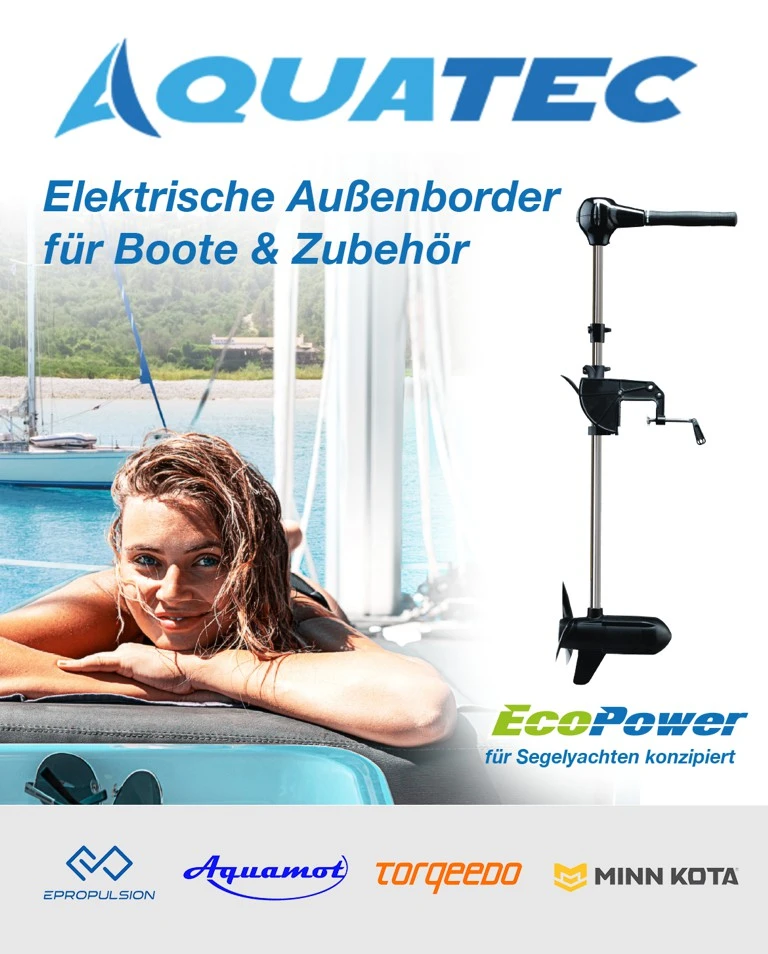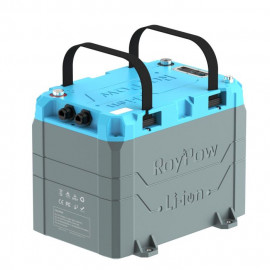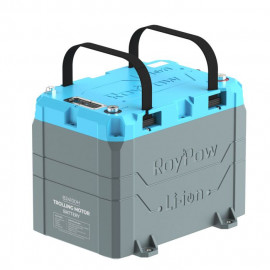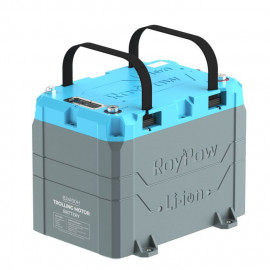The right battery
What is the right boat battery for my electric drive?
As a passionate sailor, it is of great importance to me the right boat battery . Choosing the right one Batteries for electric outboards is critical to ensuring the best possible user experience. The energy for the boat's electric motor is obtained from batteries or rechargeable batteries. The type, size, circuit and capacity of the battery or rechargeable battery are decisive for how efficiently and for how long the electric drive is powered. Different types of batteries such as AGM, gel, lithium or lead acid require different handling. Also play Size and weight of the batteries or batteries, as the storage space on a boat is limited and the charging times depending on circumstances such as solar cells or Battery charger must be observed. The goal is therefore to get as much energy as possible from the most compact size of the battery or accumulator. I have listed the most important battery types for you.
Lead-acid batteries
These batteries have a long history, and are popular because of their cost-effectiveness. Many of us started with them because they are relatively cheap and widely available. Lead acid is the classic energy source for boat engines and also the cheapest variant - but it has far fewer charging cycles than AGM or lithium and can only be discharged to 50% before the battery is damaged. Batteries with lead-acid come in many different designs - from unusable to suitable for running electric boat engines (in this case, they are usually referred to as a "boat battery" because only in this case is the battery completely closed and no toxic gases are escaping as in a vehicle).
- Advantages:
- Low initial cost
- Robust and reliable
- Easy to use
- Disadvantages:
- Higher weight
- Low energy density: must be larger to deliver the same power
- Regular maintenance required to maximize service life
AGM Batteries
AGM batteries are an advanced form of lead-acid batteries that can be considered standard today. They are considered a proven battery technology and are ideal as boat batteries for electric drives but also as supply batteries. AGM batteries are inexpensive, durable and versatile - from starter batteries to batteries for continuous operation of electric motors. They are a good compromise for those who find lithium batteries too expensive, but still want more charge cycles than classic lead-acid batteries and a higher depth of discharge of up to 80% without risking battery damage.
- Advantages:
- Maintenance-free: no need to refill with water
- Better performance at low temperatures
- Less self-discharge
- Disadvantages:
- Higher initial cost compared to traditional lead-acid batteries
Lithium Batteries (LiFePO4)
If you're looking for maximum performance and efficiency, you won't be able to avoid lithium-ion batteries. The difference to lead-acid or AGM batteries in terms of size, weight and range is enormous. Lithium batteries are lightweight, powerful, and can be recharged often, making them ideal for marine batteries. They can be discharged particularly deep and can therefore be used very flexibly.
- Advantages:
- Lightweight and compact
- High energy density and longer service life (significantly more charging cycles)
- Faster loading times
- Disadvantages:
- High initial investment
- Requires special chargers
So, depending on your needs and budget, there are different options, all of which have their own advantages and disadvantages. These considerations are crucial when it comes to getting the most out of your boat batteries.
Factors when choosing a boat battery
Now that we've looked at the different types of batteries for boat electric drives, it's important to understand some key factors that should be considered when choosing the right battery. My experience shows that the correct decision can have a significant impact on safety, durability and efficiency.
Range & Capacity
An essential factor when choosing a boat battery is the desired range, i.e. the distance you can cover with it. Capacity plays a decisive role and is often underestimated. I hear again and again from my prospective buyers: "I only need the lull valve for the port area". But what happens if you are in the middle of the lake and the wind suddenly disappears? Or if a storm comes up faster than you thought and you want to get back to your home port quickly, but the wind is coming from exactly that direction?
- Capacity specification : The power is given in ampere-hours (Ah). Basically, the higher the Ah number, the longer you can drive.
- Energy consumption : Consider the energy consumption of your outboard. A powerful motor requires more energy and therefore a battery with a higher capacity.
- However, the calculation is simple: Each motor has a consumption specification of how many amperes (A) it consumes at most, for example 100A. Now we sailors rarely drive with maximum thrust but mostly engine gentle, perhaps with 50% of the maximum twist grip setting. However, we do not consume 50A (50% of the maximum consumption), but only about 30A, because the consumption is not directly proportional in relation to speed. Now batteries should not be discharged more than 50% (exception LiFePo4). Now let's assume you have a 100Ah battery (50% usable), then you would have a range of about 1.5 hours based on this calculation example. With 1/4 twist grip adjustment even 2.5 hours. Measurements from practice or also here as a video: EcoPower 3.0 Electric Outboard - Test Results
Weight & Size of Battery
The weight of the battery has little influence on the maneuverability of your boat, but you should keep in mind that batteries with 100Ah weigh around 20-25kg (except lithium batteries). But the space requirement can also play a big role, because 150Ah batteries have a length of about 50cm and a weight of 45kg!
- Size : The battery must also fit in the designated space of your boat. An incorrect size can not only make it difficult to handle, but it can also be risky.
- Weight : Proper weight distribution is crucial for the boat's stability on the water.
Longevity
The longevity of a battery is another important factor that I can emphasize from my own experience. The longer the battery lasts, the longer the period until you have to invest again.
- Cycle Life : Lithium-ion batteries typically have a significantly longer lifespan than lead-acid batteries.
- Maintenance : Lead-acid batteries require regular maintenance, which can be time-consuming in the long run, so special AGM batteries are suitable for boaters, especially if weight is a minor factor.
These factors should not be underestimated when choosing your boat battery. The right mix ensures that you can enjoy your boating experience to the fullest without having to worry about battery power.
Result
After an in-depth look at the different types of batteries and the deciding factors when choosing a boat battery for electric outboards, it's time to summarize the key points. As someone who has gained a lot of experience myself, I want to help you make the best decision for your needs.
Summary of key points
- Battery Types : We have seen that there are three main types of batteries:
- Lead-acid batteries, which are cost-effective but much shorter-lived than AGM and also not maintenance-free.
- AGM batteries that offer good performance and are maintenance-free, the best value for money.
- Lithium batteries (LiFePO4), which are very light, powerful and durable, but require a significantly higher initial investment.
- Factors in the selection :
- Range & Power Capacity : Choose a battery with sufficient ampere hours to always have sufficient reserves.
- Weight & Size : Make sure that the battery is suitable and well placed in the boat to ensure optimal boat behavior.
- Longevity : Consider how often you need to replace the battery and choose accordingly.
These considerations are crucial to ensure that you can enjoy your electric outboard for a long time. So, take the time to examine your options. Consider your individual needs and driving habits. Whether you want to cover short or long distances with an engine, the right boat battery will ensure that you always get back to your home port without any problems.
These lithium (LiFePO4) batteries are IP67 waterproof, deliver extra strong performance, are easy to install, and can ...
Shipping time: 2-3 working days
These lithium (LiFePO4) batteries are IP67 waterproof, deliver extra strong performance, are easy to install, and can ...
Shipping time: 2-3 working days
These lithium (LiFePO4) batteries are IP67 waterproof, deliver extra strong performance, are easy to install, and can ...
Shipping time: 2-3 working days










